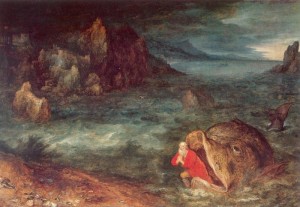So the lectionary this week give us the beginning of the story of a prophet Jonah this week. It’s a story that often gets lost in heated debates about the possibility of a fish swallowing a man, or on the true history of Assyria. But listen to the story again, listen to what it might mean for people who would be people of faith.
Jonah, the prophet, the professional religionist, the person who had dedicated his life to follow the call of God, hears the call of God to go East to the capital of the Evil Empire, to call them to turn around before disaster overtakes them. But the prophet, shockingly, sets out to take a ship West to the end of the known word. Unfortunately, for the prophet, this meant boarding a ship with Phoenician sailors. They were rough. Their language was coarse. They set idols of their ancestors beside their bunk-beds. The prophet kept his distance from these pagans of questionable moral character.
But on the journey away from his calling, the Wave hit. The ship bounced on the restless sea. The sailors used their knowledge of sailing—to no avail. They prayed to their gods—to no avail. Then Jonah said, “No, this is all about me. My God, the only God, the true God, not one of your disgusting idols, is trying to turn me around. But I’d rather die than turn around. Throw me into the sea and the storm will be over.” The sailors looked at the prophet and said, “No. Who do you think we are, anyway? That wouldn’t be right.” So they tried harder, prayed harder—to no avail. Finally, at their wit’s end, and at Jonah’s insistence, they threw him into the sea. The prophet hit the water with a thump. The End.
But the God sent a great fish to swallow up the prophet and rescue him from the crisis. For three days the prophet thought rather deeply about his life and calling. Then the fish vomited and Jonah landed East of where he started, on his way to the Evil Empire. The prophet preached a strange sermon in the City. “God is going to judge this evil city. Forty Days and this city will be destroyed.” But then an even stranger thing happened. The people in the City said, “He’s right, you know. We need to do something about health care. We need to take better care of our children and our elders.” So the city declared a day to grieve their way of life; the leaders began to frame new legislation to reform the City.
The prophet meanwhile waited on a hill outside the city for God’s lightning to destroy these pagans, those no account people whose god was wealth and power. Those violent people whose had brought pain and suffering and even death to so many people, some in his own family. But no lightning came. The prophet seethed. But no lightning from heaven came. The prophet said, “Oh fine. Those pagans live for nothing but power. Those heathens kill the innocent. Those wicked people deserve to die. But now they say, ‘Oh we’re really sorry. We’ll do better.’ And you let them live! I’m so angry I could die.”
The God said to the prophet, “Do you know how many people who don’t know their right from their left in this city? How have they harmed you?”
Then the story (and the book of the Bible) concludes with the God’s question: “Does being angry make you well?”
So I would invite you to ask this question. What is God saying to me or to our communities of faith in this story?





